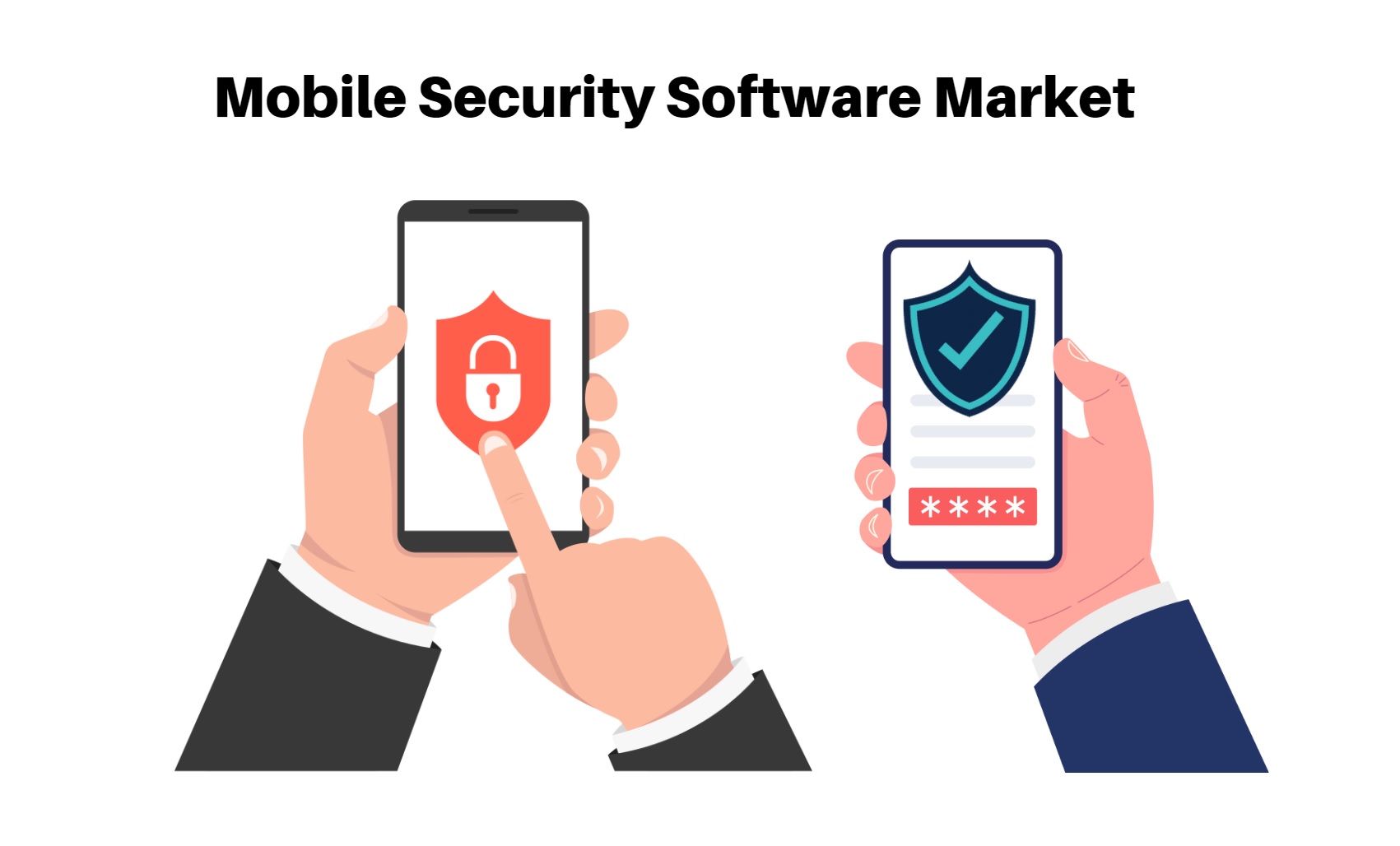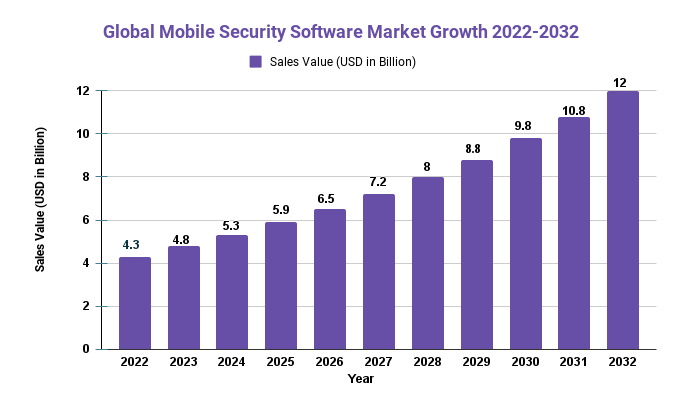Mobile Security Software Market is poised to grow at a CAGR of 10.7% by 2032

Page Contents
Market Overview
Published Via 11Press: The Mobile Security Software Market size is expected to be worth around USD 12.00 Bn by 2032 from USD 4.3 Bn in 2022, growing at a CAGR of 10.7% during the forecast period from 2022 to 2032.
Over the past few years, there has been an exponential rise in demand for mobile security software. People are becoming more concerned about data security and privacy due to the rising use of tablets and smartphones. There is now a flood of providers offering solutions to safeguard sensitive and personal data.
As consumers seek reliable protection against hackers, viruses, malware and other cyber threats, this market is expanding rapidly. This trend has been fuelled by the growth of mobile commerce and online banks. When making mobile transactions, customers want to ensure their financial information remains secure; mobile security software provides both individual and business peace of mind in this regard.
Request For Sample Report Here: https://market.us/report/mobile-security-software-market/request-sample/

Key Takeaways
- The mobile security software market is experiencing rapid expansion due to the rising prevalence of mobile devices and the requirement to protect them against various threats.
- The market size is expected to expand rapidly over the coming years, with a compound annual growth rate (CAGR) of 10.7% during the forecast period.
- Apple (US), Intel Security (McAfee)(US), Symantec(US), VMware(US), Microsoft(US), F-Secure(Finland), Citrix(US), Trend Micro(Japan), AVG Technologies(Netherlands), Sophos(UK) CA Technologies(UK), Avast(Czech), BullGuard(UK) are some of the key players in this market.
- These companies offer a selection of mobile security solutions, such as antivirus software, anti-malware software, mobile device management (MDM) solutions and mobile VPNs.
- The market is highly competitive with companies continuously innovating to stay ahead of the constantly shifting threat landscape.
- The mobile security software market is expected to keep expanding as more businesses and consumers adopt mobile devices and the threat landscape becomes increasingly complex.
Regional Analysis
- North America is a major market for mobile security software, due to the widespread adoption of smartphones and an increasing need for security solutions. The United States and Canada are two key contributors to this growth in this space.
- Europe is a major market for mobile security software, with countries such as Germany, the UK, France and Italy dominating. This growth can be attributed to an ever-increasing number of smartphone users and an ever-increasing need for effective security solutions.
- The Asia-Pacific region is projected to experience significant growth in the mobile security software market due to the growing adoption of mobile devices and an increasing need for security solutions. Countries such as China, Japan, India, and South Korea are anticipated to be major contributors towards this region's market expansion.
- The Middle East and Africa region is expected to witness significant growth in the mobile security software market due to increasing smartphone penetration rates and demand for security solutions. Furthermore, cloud-based security solutions are becoming more widely adopted across this region as more users adopt them.
- The Latin American mobile security software market is expected to expand due to the rising adoption of smartphones and the need for security solutions. Brazil and Mexico are anticipated to be major contributors in this region's development.
- Overall, the mobile security software market is expected to expand across all regions due to an increasing reliance on mobile devices and an increasing need for security solutions.
Purchase This Report At Discounted Rate Here: https://market.us/purchase-report/?report_id=12356
Drivers
- Increased Use of Mobile Devices: As mobile device usage such as smartphones and tablets increases, so does the demand for security software. As more people rely on these devices for personal and professional activities, protecting sensitive data and preventing cyber-attacks becomes ever more essential.
- Evolving Threat Landscape: As the threat landscape continues to evolve, cybercriminals are developing more sophisticated ways of attacking mobile devices. This necessitates the need for mobile security software that can detect and prevent various threats such as malware, viruses, phishing attempts, and data breaches.
- Growing Mobile Workforce: As more employees access corporate data and applications on their smartphones, companies must ensure these devices remain secure from cyber threats.
- Regulatory Compliant: As regulatory requirements and industry standards increase, more businesses that handle sensitive data like financial institutions and healthcare organizations must adhere to regulations that require them to employ robust security measures in order to safeguard their information. Mobile security software plays a significant role in meeting these requirements.
- Consumer Awareness: As consumers become more informed of the potential risks associated with mobile devices, they are increasingly looking for security solutions to safeguard their personal information. As more individuals recognize the significance of mobile security, demand for such software is expected to surge.
- Overall, the mobile security software market is being driven by technological, regulatory, and social factors and is expected to keep growing as mobile device usage becomes even more widespread.
Restraints
- High Cost: The high cost of mobile security software can be a deterrent for small businesses and individuals, prohibiting the adoption of effective solutions. Furthermore, some solutions may lack comprehensive protection measures due to their high price tags.
- Limited Awareness: Despite the growing awareness of mobile security threats, some users still lack an understanding of their significance. This may result in a lack of investment in software for mobile security or an unwillingness to pay for solutions related to mobile security.
- Compatibility Issues: With so many types of mobile devices and operating systems, ensuring compatibility between all can be a challenge for mobile security software providers. This could limit its effectiveness as well as add extra costs for customers.
- Privacy Concerns: Some users may be reluctant to use mobile security software due to worries about privacy and data collection. This could restrict the adoption of these solutions and foster a negative perception of the industry as a whole.
- Emerging Technologies: As emerging technologies such as Artificial Intelligence and Machine Learning become more widespread, traditional mobile security software may find itself challenged. This could restrict market growth and present opportunities for innovative newcomers with creative solutions.
- Overall, while there are challenges facing the mobile security software market, providers are striving to overcome them by offering more cost-effective and user-friendly solutions, informing users about their importance, and staying ahead of emerging threats and technologies.
Opportunities
- Emerging Markets: The rising adoption of mobile devices in emerging markets presents a major growth opportunity for mobile security software providers. As more people in these regions become connected via smartphones, the need for robust security solutions will only increase.
- Cloud-based security solutions offer several advantages, such as scalability, cost efficiency, and ease of deployment. As more organizations move their operations to the cloud, there will be an increasing demand for mobile security solutions integrated with cloud-based platforms.
- Mobile Payment Security: With the increasing popularity of mobile payment systems, there is an increasing need for security solutions that can protect financial transactions on mobile devices. Mobile security software providers can take advantage of this trend by offering comprehensive mobile payment security solutions.
- IoT Security: The Internet of Things (IoT) poses unique security risks, as connected devices may be vulnerable to cyber-attacks. Mobile security software providers can offer solutions that shield these devices from malware, data breaches, and other cyber criminals.
- Advanced Threat Detection: As the threat landscape continuously changes, mobile security software providers can stay ahead of emerging risks by investing in cutting-edge detection technologies like Artificial Intelligence and Machine Learning.
- Overall, the mobile security software market offers several opportunities for growth and innovation. Companies that can provide comprehensive, user-friendly, yet cost-effective solutions will be well-positioned to take advantage of these prospects.
Challenges
- Fragmented Market: The mobile security software market is highly fragmented, with many providers offering a variety of solutions. This can make it challenging for customers to select the ideal solution and limit the adoption of mobile security software. Lack of Standardization Unfortunately, there is currently a lack of standardization in the mobile security software market, with different providers offering different features and functions. This can cause compatibility issues and limit the effectiveness of mobile security solutions.
- Rapidly Evolving Threats: The threat landscape is constantly shifting, with cybercriminals creating more sophisticated attacks. This makes it challenging for mobile security software providers to stay abreast of emerging risks and can limit the effectiveness of traditional security measures. User Education Despite rising awareness of mobile security risks, some users still lack an understanding of its significance. This can hinder the uptake of solutions for protecting mobile data and place organizations at greater risk.
- Regulatory Compliant: As more regulatory requirements and industry standards demand the use of mobile security software, compliance can be complex and expensive potentially deterring some from adopting such solutions.
- Overall, the mobile security software market faces several obstacles that could restrict growth and innovation. To guarantee the continued success of their business, mobile security software providers must stay ahead of emerging threats, work towards standardization, educate users on security practices, and adhere to regulations.
Recent Developments
- Fortinet purchased enSilo in October 2019 to expand its security portfolio. It is an advanced endpoint security solution provider that provides real-time detection and response capabilities for protecting mobile endpoints.
- Microsoft's Endpoint Manager was launched in May 2019. It includes both Intune and Configuration Manager capabilities, as well as additional Microsoft services and products. Endpoint managers allow enterprises to manage large numbers of mobile devices that are being used by employees.
- Broadcom, a global provider of infrastructure and semiconductor software solutions, purchased Symantec's enterprise security business in August 2019. Broadcom's infrastructure software portfolio will be significantly expanded by the integration of Symantec’s enterprise security portfolio and Broadcom’s existing solution portfolio.
- Trend Micro's XGen endpoint security was launched in October 2018. It is a combination of cross-generational threat defense systems that intelligently applies the correct solution. This results in more effective protection against threats.
- CrowdStrike's CrowdStrike Falcon Endpoint Protection Platform was launched in April 2018. It combines the EPP technology with CrowdStrike's existing solutions. EPP technology includes a Falcon endpoint protection team that is skilled and experienced.
Report Scope
| Report Attribute | Details |
| The market size value in 2022 | USD 4.3 Bn |
| Revenue forecast by 2032 | USD 12.00 Bn |
| Growth Rate | CAGR Of 10.7% |
| Regions Covered | North America, Europe, Asia Pacific, Latin America, and Middle East & Africa, and the Rest of the World |
| Historical Years | 2017-2022 |
| Base Year | 2022 |
| Estimated Year | 2023 |
| Short-Term Projection Year | 2028 |
| Long-Term Projected Year | 2032 |
Key Market Segments
Type
- Mobile Identity Management
- Mobile Data Security
- Mobile Security as a Service
- Mobile Device Security
- Mobile Virtual Private Networks
- Mobile Device Management
Application
- E-mail Spam Blocking
- Anti-Virus
- Malware Removal
Key Market Players included in the report:
- Apple (US)
- Intel Security (McAfee) (US)
- Symantec (US)
- VMware (US)
- Microsoft (US)
- F-Secure (Finland)
- Citrix (US)
- Trend Micro (Japan)
- AVG Technologies (Netherlands)
- Sophos (UK)
- CA Technologies (UK)
- Avast (Czech)
- BullGuard (UK)
Frequently Asked Questions
What is the market study period?
The Mobile Security Software Market is studied from 2017 – 2032.
What is the growth rate for the Mobile Security Software Market?
The Mobile Security Software Market is growing at a CAGR of 10.7%
Which region experiences the highest rate of growth in the Mobile Security Software Market?
Asia Pacific is growing at the highest CAGR over 2022- 2032.
Which region is the largest in the Mobile Security Software Market?
North America holds the highest share in 2022.
Who are the major players in the Mobile Security Software Market?
Apple (US), Intel Security (McAfee) (US), Symantec (US), VMware (US), Microsoft (US), F-Secure (Finland), Citrix (US), Trend Micro (Japan), AVG Technologies (Netherlands), Sophos (UK), CA Technologies (UK), Avast (Czech), BullGuard (UK)
The team behind market.us, marketresearch.biz, market.biz and more. Our purpose is to keep our customers ahead of the game with regard to the markets. They may fluctuate up or down, but we will help you to stay ahead of the curve in these market fluctuations. Our consistent growth and ability to deliver in-depth analyses and market insight has engaged genuine market players. They have faith in us to offer the data and information they require to make balanced and decisive marketing decisions.



